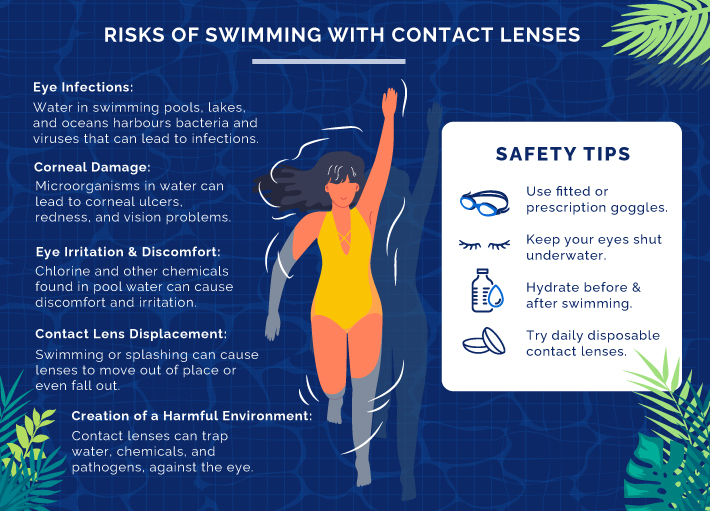Imagine the sun shining, the waves crashing, and the sand beneath your feet as you prepare for a perfect day at the beach. But wait—can you wear your contact lenses in this salty, sandy paradise?
It’s a question many contact lens wearers face as they plan their beach outings. You want to enjoy every moment without worrying about your vision or eye health. We’ll dive into everything you need to know about wearing contacts at the beach.
From protecting your eyes from irritants to ensuring your lenses stay comfortable, we’ve got you covered. Stay with us to discover tips and tricks that will keep your eyes happy and your beach day stress-free!

Credit: www.contactsdirect.com
Benefits Of Wearing Contacts At The Beach
Enjoy clear vision while swimming and sunbathing with contact lenses at the beach. Contacts offer freedom from bulky glasses, allowing you to fully immerse in beach activities. Plus, they provide a wider field of view, enhancing your overall beach experience.
Wearing contacts at the beach can transform your seaside experience. Imagine enjoying the stunning ocean view without constantly adjusting your glasses. Contacts offer a liberating alternative, enhancing your beach day in ways you might not have considered. Whether you’re lounging in the sun or diving into the waves, contacts provide convenience and freedom.Convenience And Comfort
Contacts eliminate the hassle of glasses slipping off your nose or fogging up. You won’t worry about losing them in the sand or water. With contacts, you can run, jump, and splash without interruptions. They also offer a wider field of vision, making it easier to spot your friends or keep an eye on your belongings.Enhanced Beach Activities
Think about how much more fun beach activities become with contacts. Swimming, surfing, or playing volleyball becomes a breeze. You don’t have to pause to adjust your glasses or worry about losing them. Contacts stay put, allowing you to immerse yourself fully in the experience.Protection Against Sun Glare
Contacts can reduce glare from the sun, which is often intense at the beach. Many contact lenses come with UV protection, shielding your eyes from harmful rays. This means you can enjoy the sun without squinting or straining your eyes, making your time at the beach more enjoyable.Seamless Transition Between Environments
Imagine transitioning from the bright beach to a shaded café effortlessly. Contacts adapt seamlessly, unlike glasses that might require swapping to sunglasses. This adaptability makes contacts ideal for a beach day that includes various activities and environments.Boosts Confidence
Do contacts make you feel more confident? Many people find they feel more relaxed without glasses framing their face. Contacts allow you to enjoy the beach while feeling more like yourself. This boost in confidence can enhance your overall experience, making the day even more memorable. Consider these benefits next time you plan a beach trip. Could contacts be your new beach essential?Risks Of Wearing Contacts In Water
Wearing contacts at the beach can seem convenient. Yet, water poses risks to your eyes when using contacts. Awareness of these risks is crucial to prevent discomfort and infections.
Risk Of Eye Infections
Contacts can trap bacteria from water. This increases the chance of eye infections. Saltwater, like ocean water, contains various microbes. These can attach to contacts and infect your eyes.
Dry Eyes And Irritation
Beach wind and sun can dry your eyes quickly. Contacts may worsen dryness, leading to irritation. Dry eyes feel scratchy and uncomfortable.
Loss Of Contact Lenses
Water activities can dislodge lenses. Losing a lens in the ocean is common. Swimmers often face this issue due to waves and movement.
Reduced Visibility
Saltwater can cause blurred vision with contacts. It may lead to reduced visibility. This can be dangerous during activities like swimming or surfing.
Corneal Abrasion
Sand or debris can get under lenses. This may scratch the cornea. Corneal abrasions are painful and require immediate care.
Choosing The Right Contacts For Beach Days
Heading to the beach offers fun, sun, and relaxation. For contact lens wearers, choosing the right pair is crucial. The sand, sun, and water can affect your eyes. Picking the best contacts ensures comfort and eye health. Explore two great options for beach days below.
Daily Disposables
Daily disposable lenses are a fantastic choice for the beach. These lenses offer convenience and hygiene. You wear them once and then throw them away. This reduces the risk of eye infections. Sand and saltwater won’t be a problem. Always bring extra pairs for emergencies.
Uv-blocking Contacts
UV-blocking contacts provide extra protection from the sun. They shield your eyes from harmful UV rays. This is important since sunlight can damage your eyes. They work well with sunglasses for double protection. Choose brands that offer high UV protection ratings.

Credit: calgaryfamilyeyedoctors.com
Safety Tips For Beach Activities
Beach trips can be risky for contact lens wearers. Sand and saltwater may irritate your eyes. Consider wearing goggles or switching to prescription sunglasses for better protection.
When planning a beach day with contacts, safety is key. Many wonder if contacts are safe at the beach. They can be, with the right precautions. Sand, sun, and sea can pose challenges. Here are some tips to protect your eyes. Keep them safe while enjoying the waves.Avoiding Direct Water Contact
Direct water contact with contacts can lead to infections. Seawater contains bacteria that can harm your eyes. Try not to open your eyes underwater. Consider wearing swim goggles. They offer a barrier against water. If water enters your eyes, rinse them immediately with clean water. Keep a travel-sized saline solution handy. It helps to rinse out any irritants.Using Protective Eyewear
Bright sunlight can strain your eyes. Wear sunglasses with UV protection. They shield your eyes from harmful rays. Polarized lenses reduce glare from the water. This makes your beach experience more comfortable. Sunglasses also protect against wind and sand. Choose wrap-around styles for better coverage. They prevent particles from entering your eyes.Maintaining Hygiene At The Beach
Enjoying the beach while wearing contacts requires careful hygiene. Keep your hands clean to avoid eye infections. Carry lens solution and a case for emergencies.
Heading to the beach is a perfect way to unwind and soak in the sun, but if you’re wearing contact lenses, maintaining hygiene becomes crucial. The salty air, sand, and ocean waves can pose challenges, but with a few simple steps, you can keep your eyes healthy and enjoy your day. Keeping your contact lenses clean isn’t just about comfort; it’s about ensuring your eye health is protected at all times.Proper Hand Washing
Before handling your contact lenses, washing your hands thoroughly is vital. Use soap and water, and take your time to scrub all the nooks and crannies of your hands. Ensure your hands are completely dry before touching your lenses. Even small amounts of water can introduce bacteria. Remember: Sand and saltwater are not your lenses’ friends.Using Sterile Solutions
Always use sterile contact lens solutions for cleaning and storing your lenses. Tap water can harbor harmful microorganisms that aren’t visible to the naked eye. Consider bringing a travel-sized bottle of your lens solution to the beach. It ensures you can rinse your lenses if sand or debris gets in your eyes. Tip: Be discreet and store it in a shaded area to avoid overheating. Maintaining hygiene at the beach doesn’t have to be a chore. With a little preparation, you can protect your eyes and have a great time. What other steps do you take to ensure eye safety while enjoying the beach?Managing Sand And Debris
Wearing contacts at the beach can be tricky. Sand and debris are everywhere. They pose challenges to contact lens wearers. With care, you can manage these issues effectively.
Handling Irritation
Sand can cause eye irritation. Contacts increase sensitivity to particles. Quick action is vital. Blink several times to clear sand. Avoid rubbing your eyes. Rubbing can worsen irritation. Use lubricating eye drops for relief. Eye drops help remove debris gently.
Cleaning Tips
Keep your lenses clean. Sand can stick to contacts. Carry a contact lens case. Store your lenses safely when not in use. Use saline solution to rinse lenses. It washes away sand and dirt. Clean your hands before touching lenses. Dirty hands transfer debris to your eyes.
Alternatives To Contacts At The Beach
Enjoying the beach with contacts can be tricky due to sand and water exposure. Consider wearing prescription sunglasses or swimming goggles. These options protect your eyes from irritation and provide clear vision while soaking up the sun and surf.
Alternatives to contacts at the beach offer comfort and safety. Sand and saltwater can irritate eyes with contacts. The beach environment poses risks for contact lens wearers. Exploring other options ensures a worry-free experience.Prescription Goggles
Prescription goggles provide clear vision in the water. They protect eyes from saltwater and sand. Goggles fit securely and prevent irritation. For swimming, they offer a practical solution. Available in various styles and prescriptions. Easy to find online or at sporting goods stores. They ensure comfort and clarity underwater.Wearing Glasses
Glasses are a reliable alternative at the beach. They offer protection from sun and wind. Many styles include UV protection. Ideal for those who prefer not to wear contacts. Choose frames that suit outdoor activities. Secure-fitting glasses stay in place during movement. Consider a strap for added security. Glasses are easy to clean and maintain.
Credit: us.daysoft.com
Frequently Asked Questions
Can You Swim With Contacts At The Beach?
Swimming with contacts at the beach isn’t recommended. Saltwater can irritate your eyes and cause infections. Additionally, sand and debris may get trapped under lenses. Consider wearing prescription goggles or sunglasses for protection and vision correction. Always carry a backup pair of contacts or glasses just in case.
Are Contacts Safe In Salty Beach Water?
Contacts are not safe in salty beach water. Salt can cause discomfort and irritation. It increases the risk of infection and lens contamination. It’s best to remove contacts before swimming. Use water-resistant eyewear like goggles for vision protection. Always clean and disinfect lenses after exposure to water.
How Can I Protect My Eyes On The Beach?
Protect your eyes on the beach by wearing sunglasses with UV protection. Consider using prescription goggles if you need vision correction. Avoid rubbing your eyes if sand gets in. Stay hydrated and use lubricating eye drops to prevent dryness. Always have a backup pair of glasses or contacts.
What Should I Do If Sand Gets In Contacts?
If sand gets in your contacts, remove them immediately. Rinse your eyes with clean water to remove particles. Clean and disinfect your lenses thoroughly before reinserting. Avoid rubbing your eyes to prevent irritation. If discomfort persists, consult an eye care professional for advice.
Conclusion
Enjoying the beach with contacts is possible with care. Always prioritize eye safety. Carry a lens case and solution. Wear sunglasses to shield against sand and sun. Avoid swimming with contacts to prevent infections. Use daily lenses for convenience and hygiene.
Consider consulting your eye doctor for advice. Remember, comfort and health are key for beach fun. A few precautions ensure a pleasant experience. Follow these tips for safe beach adventures. Happy beach day!
